Related Research Articles

Subhas Chandra Bose was an Indian nationalist whose defiant patriotism made him a hero in India, but whose attempt during World War II to rid India of British rule with the help of Nazi Germany and Imperial Japan left a troubled legacy. The honorific Netaji, first applied to Bose in Germany in early 1942 by the Indian soldiers of the Indische Legion and by the German and Indian officials in the Special Bureau for India in Berlin, was later used throughout India.
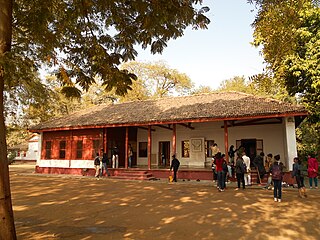
Sabarmati Ashram is located in the Sabarmati suburb of Ahmedabad, Gujarat, adjoining the Ashram Road, on the banks of the River Sabarmati, 4 miles (6.4 km) from the town hall. This was one of the many residences of Mahatma Gandhi who lived at Sabarmati (Gujarat) and Sevagram when he was not travelling across India or in prison. He lived in Sabarmati or Wardha for a total of twelve years with his wife Kasturba Gandhi and followers, including Vinoba Bhave. The Bhagavad Gita was recited here daily as part of the Ashram schedule.
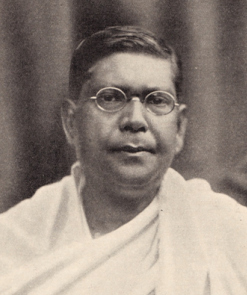
Chittaranjan Das, popularly called Deshbandhu, was an Indian freedom fighter, political activist and lawyer during the Indian independence movement and founder-leader of the Swaraj Party in Bengal during the period of British colonial rule in India. His name is abbreviated as C. R. Das.
Bengali Brahmos are those who adhere to Brahmoism, the philosophy of Brahmo Samaj which was founded by Raja Rammohan Roy. A recent publication describes the disproportionate influence of Brahmos on India's development post-19th Century as unparalleled in recent times.

Gandhi Jayanti is an event celebrated in India to mark the birthday of Mahatma Gandhi. It is celebrated annually on 2 October, and it is one of the three national holidays of India. The UN General Assembly announced on 15 June 2007 that it adopted a resolution which declared that 2 October will be celebrated as the International Day of Non-Violence. He is also known as the "Father of The Nation" and this title was given to him by Netaji Subhash Chandra Bose for his relentless struggles for independence.

Khadi, derived from khaddar, is a hand-spun and woven natural fibre cloth coined in 1918 by Mahatma Gandhi during freedom struggle of the Indian subcontinent, 'Khadi' term is used throughout India, Pakistan and Bangladesh. The first piece of the hand-woven cloth was manufactured in the Sabarmati Ashram during 1917-18. The coarseness of the cloth led Gandhi to call it 'khadi'. The cloth is usually hand spun and woven from cotton. However, it may also include silk or wool, which are all spun into yarn on a spinning wheel called a charkha. It is a versatile fabric, cool in summer and warm in winter. In order to improve its looks, khādī/khaddar is sometimes starched to give it a stiffer feel. It is widely accepted in various fashion circles. Popular dresses are made using khadi cloth such as dhoti, kurta, and handloom sarees such as Puttapaka Saree, Kotpad Handloom fabrics, Chamba Rumal, Tussar silk etc. Gajam Anjaiah, an Indian master handloom designer and a recipient of the Padma Shri, is known for his innovation and development of tie-dye handloom products along with the Telia Rumal technique of weaving products based on the Ikat process.
The Swaraj Party was established as the Congress-Khilafat Swaraj Party. It was a political party formed in India on 1 January 1923 after the Gaya annual conference in December 1922 of the National Congress, that sought greater self-government and political freedom for the Indian people from the British Raj.

Panihati is a city and a municipality of North 24 Parganas district in the Indian state of West Bengal. It is close to Kolkata and also a part of the area covered by Kolkata Metropolitan Development Authority (KMDA).

Sodepur or Sodpur is a locality in Panihati Municipality of North 24 Parganas district in the Indian state of West Bengal. It is close to Kolkata and also a part of the area covered by Kolkata Metropolitan Development Authority (KMDA).
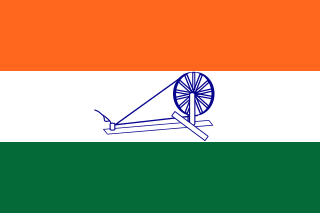
The Indian National Congress was established when 72 delegates from all over the country met at Bombay in 1885. Prominent delegates included Dadabhai Naoroji, Surendranath Banerjee, Badruddin Tyabji, W. C. Bonnerjee, S. Ramaswami Mudaliar, S.Subramanya Iyer and Romesh Chunder Dutt. The Englishman A.O. Hume, a former British civil servant was one of the founding members of the Indian National Congress.
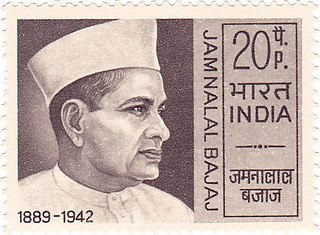
Jamnalal Kaniram Bajaj was an Indian industrialist. He founded the Bajaj Group of companies in the 1920s, and the group now has 24 companies, including six that are listed on the bourses. He was also a close and beloved associate of Mahatma Gandhi, who is known to have often declared that Jamnalal was his fifth son.
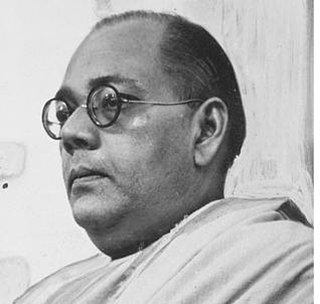
Sarat Chandra Bose was an Indian barrister and independence activist.
Atulya Ghosh was a Bengali Indian politician. He has been described as "a wise, scholarly and honest leader who was a superb political organizer. "
Satish Chandra Mukherjee was a pioneer in establishing a system of national education in India, along with Sri Aurobindo.

The Noakhali riots were a series of semi-organized massacres, mass rapes, abductions and forced conversions of Hindus to Islam and looting and arson of Hindu properties perpetrated by the Muslim community in the districts of Noakhali in the Chittagong Division of Bengal in October–November 1946, a year before India's independence from British rule.

The online Gandhi Heritage Portal preserves, protects, and disseminates original writings of Mohandas K. Gandhi and makes available to the world the large corpus of “Fundamental Works” which are useful for any comprehensive study of the life and thought of Gandhiji. Gandhiji was 24 years old in South Africa "Natal Indian Congress " made in 1894.

Sukchar is a locality in Panihati Municipality of North 24 Parganas district in the Indian state of West Bengal. It is close to Kolkata and also a part of the area covered by Kolkata Metropolitan Development Authority (KMDA).
Gangadharrao Balkrishna Deshpande also known as Lion of Karnataka, Khadi Bhageeratha of Karnataka, was an Indian activist who was the leader of the Indian independence movement against British colonial rule from Belgaum and the right-hand man of both Lokamanya Tilak and Mahatma Gandhi in succession. Deshpande considered Lokamanya Tilak as his Guru. Deshpande served as Chairman of Karnataka branch of All-India Spinners' Association, and the All India Village Industries Association for some years. Deshpande was largely responsible for the installation of Premier of Bombay, B. G. Kher.
References
- ↑ "Satish Chandra Dasgupta". gandhimuseum.org. Retrieved 2021-08-29.
- ↑ Bakshi, Shiri Ram (1981). Gandhi and Salt Satyagraha. Vishwavidya Publishers.
- ↑ "'I shall try to treat Sodepur on the same footing as Sabarmati'". www.telegraphindia.com. Retrieved 2021-08-29.
- ↑ ":: Welcome to Panihati Municipality ::". panihatimunicipality.in. Retrieved 2021-08-29.
- ↑ Gandhi, Rajmohan (2007). Mohandas: A True Story of a Man, His People, and an Empire. Penguin Books India. ISBN 978-0-14-310411-7.
- ↑ "Gandhi Memorial Asram". West Bengal Heritage Commission. Retrieved 2021-08-29.
- ↑ "An experiment in Khadi, and Gandhi's eastern base". Hindustan Times. 2019-09-30. Retrieved 2021-08-29.